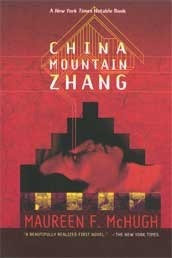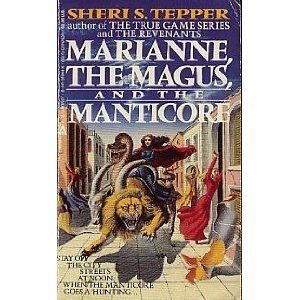China Mountain Zhang (and Manticores)
Marianne, the Magus & the Manticore (1985) by Sheri S Tepper
China Mountain Zhang (1992) by Maureen McHugh
So one of those tasks on my List of Stuff To Do this November was to polish off five books from my 'archived' to read shelf – that's the ones that have ended up on the lower shelf, ignored in favour of new and shiny upper shelf books which Fishpond may or may not have delivered in the last 24 hours. Many books on that lower shelf are those which I ordered or bought second hand for some specific reason, and then failed to be in the right mood for – there's a whole bunch of 'crime and cooking' novels for instance which I really should ban from the house as they have quite negative associations for me now. A whole chunk of them, like Pat Murphy's Adventures in Time and Space with Max Merriwell , are from the Geek Girl Reading List which I assembled with grand intentions and then ignored.
Part of the reason why I assembled that list in the first place was to educate myself about the history and culture of women writing science fiction and fantasy. So I shouldn't mind too much that I picked Marianne, the Magus and the Manticore off my shelf assuming it was one of the Geek Girl list (why else would I have it?) only to discover that, um, actually it isn't.
It was a happy accident, though, because HOORAY now I finally have a Sheri S Tepper novel that I like! I have a history of disliking books of hers, and I feel rather proud to now have a favourite.
I guess this also says something about writing off authors based on limited reading experience, huh?
MM&M reminded me a little of Pamela Dean's Tam Lin, in that it's about a female college student and contains quite a subtle slide towards magic, though it's a much shorter book so the wait isn't nearly as long. The whole book, in fact, is beautifully subtle. It is mostly about Marianne and her uncomfortable relationship with her half-brother Harvey, who controls her finances and uses that to exert all manner of other controls over her life. It's a very good example of an abusive relationship which doesn't involve hitting or rape or any of those huge red flag issues, but is nevertheless deeply destructive. Marianne is not allowed to or able to articulate what is wrong about this relationship for some time, and it is only when she meets the Magus and learns about the magical country that her (dead) parents came from that she comes to realise her life is not normal, nor acceptable. The magic depicted in this book is sympathetic in nature, and involves a great deal of imagination and worlds within worlds which provide a form of therapy for our heroine so she can learn to be strong. There's also a romantic element which is deeply problematic and badly timed, but is redeemed utterly because the hero is aware of how problematic it is, and how saving Marianne from her monsters is less important than allowing her to rescue herself.
This book totally should have been on that list.
[though, what the hell? While looking up the publication year I found out it's a trilogy. I'm not sure if I want to read the others! I liked it as a standalone]
 China Mountain Zhang is a book people have pretty much telling me to read for the last twelve years. (PEOPLE! You're telling it wrong!) Nevertheless, when I came to it, I knew pretty much nothing about the book. It turned out to be a very clever, beautifully told imagined future in which China is the dominant world power, and society is communist.
China Mountain Zhang is a book people have pretty much telling me to read for the last twelve years. (PEOPLE! You're telling it wrong!) Nevertheless, when I came to it, I knew pretty much nothing about the book. It turned out to be a very clever, beautifully told imagined future in which China is the dominant world power, and society is communist.
For the most part, through the novel, we follow Zhang, a young closeted gay American Born Chinese (ABC) engineer, and his uneven career path. He loves living in New York, and yet a difficult situation with his boss's daughter pushes him on another path, to the ends of the earth and even the "holy grail" of gaining an education in China itself. The idea of what success is and whether it can equate to happiness is a strong theme throughout, and it is very clear that the fact that he and so many of his friends have to hide their sexuality means that their very definitions of a successful life are often at odds with what society expects (the most highly paid jobs, for example may be in locations that would make any kind of love life physically impossible because there is no privacy).
Zhang's other secret is that his mother is Hispanic, but his parents used gene modification so that he does not appear to be mixed race, and his papers are doctored to make him appear fullblood Chinese. The emphasis on Chinese as the dominant culture is one of the most fascinating aspects of the novel, and I particularly enjoyed the way language was used to express this – McHugh's own linguistic experience lended confidence to the prose, and I love it when fiction delves into the oddities and subtleties that come from characters being bi-lingual, and using particular aspects of language to get ideas across.
As well as Zhang's story, we also get interludes through the eyes of other characters, who have tangential connections to Zhang, though not necessarily in a strong narrative sense. This very much expands the world that Zhang lives in, and makes it feel like a credible and three dimensional future. I wasn't sure what to expect from these pieces, but I did enjoy the slight connections made between them and the central story without particuarly craving a greater significance. The wiki page about the novel says that these extra stories are "following characters progressing from arrogant outsiders to finding a place in society" which wasn't something that occurred to me as I was reading them, but I don't especially agree with that. Outsiders finding a place in society, yes, but I didn't interpret any of them as especially arrogant. They were all very rich, well-conveyed characters who obviously had flaws and blind spots and confidences and skills, but not in an obnoxious sense.
Overall the book is very likeable and readable, page turning despite not being about any particular epic turning points or revelations: it is simply the story of a man building a future for himself in a world different to our own, and I can see it would be very much the kind of science fiction that a non SF reader might enjoy, if they could get past the notion that it does not tick any of the boxes that an outsider thinks SF is all about.
So… that's five out of thirty in this list, over five years. I really need to pick up the pace on this.
GEEK GIRL READING LIST
1. Cyteen – CJ Cherryh
2. The Sparrow – Mary Doria Russell
3. Slow River – Nicola Griffith
4. China Mountain Zhiang – Maureen McHugh [read 2010]
5. Wildseed – Octavia Butler
6. Oryx & Crake – Margaret Atwood
7. The Handmaid's Tale – Margaret Atwood
8. Dragonflight – Anne McCaffrey
9. In the Garden of Iden – Kage Baker
10. Her Smoke Rose up Forever – James Tiptree Jr
11. The Snow Queen – Joan D Vinge
12. Where Late the Sweet Birds Sang – Kate Wilhelm
13. Bride of the Rat God – Barbara Hambly
14. Northhanger Abbey – Jane Austen [Read 2008]
15. City of Pearl – Karen Traviss
16. Life – Gwyneth Jones
17. The Year of our War – Steph Swainston
18. Maul – Tricia Sullivan
19. Queen City Jazzy – Kathleen Ann Goonan
20. Brown Girl in the Ring – Nalo Hopkinson
21. Archangel Protocol – Lyda Morehouse [Read 2006]
22. Spin State – Chris Moriarty
23. Adventures in Time and Space with Max Merrriwell – Pat Murphy [Read 2010]
24. Sarah Canary – Karen Joy Fowler
25. Stable Strategies and Others – Eileen Gunn
26. Sexing the Cherry – Jeanette Winterson
27. Catherine called Birdy – Karen Cushman
28. Beggars in Spain – Nancy Kress
29. Dreamsnake – Vonda McIntyre
30. Tea with the Black Dragon – R A McAvoy [Read 2006]




